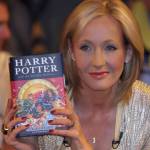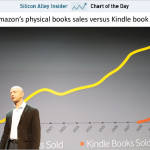Here is a clear example of zero-sum thinking, this time in literature.
Author Lynn Shepherd laments J. K. Rowling’s publishing another book, on the grounds that the successful writer crowds out the less successful. In Shepherd’s words:
“It wasn’t just that the hype was drearily excessive, or that (by all accounts) the novel was no masterpiece and yet sold by the hundredweight, it was the way it crowded out everything else, however good, however worthwhile. That book sucked the oxygen from the entire publishing and reading atmosphere. And I chose that analogy quite deliberately, because I think that sort of monopoly can make it next to impossible for anything else to survive, let alone thrive. Publishing a book is hard enough at the best of times, especially in an industry already far too fixated with Big Names and Sure Things, but what can an ordinary author do, up against such a Golgomath?”
So we should be glad that Jane Austen and Agatha Christie finally stopped writing; Apple should stop making stuff in order to give other manufacturers a chance;  perhaps Ms. Shepherd, with at least six published books herself, should make room for the under-published; and if only the Canadians would stop playing hockey so other countries could win Olympic gold.
perhaps Ms. Shepherd, with at least six published books herself, should make room for the under-published; and if only the Canadians would stop playing hockey so other countries could win Olympic gold.
Sarcasm-lite aside, let me suggest why Shepherd should be happy about Rowling’s publication and see her as an ally.
* Justice. Rowling has legitimately earned a huge, excited fan base, and simple justice means that we should respect achievement.
* Writer education. What is it about Rowling’s writing that makes it so popular? Perhaps we other authors can learn from her and improve our own writing.
* Writer inspiration. Rowling was an unknown who broke through and achieved blockbuster success. Her example can encourage the rest of us to persevere.
* Increased opportunities for writers. Rowling’s books enrich the publishing industry by bringing in money that would otherwise have been spent on, say, video-games, skateboards, clothes, or candy. More money for the publishing industry means more opportunities for all writers.
* Increased readership for the future. The Harry Potter series is legendary for creating millions of new readers. Many of them will continue to read, explore other genres, and maybe even discover Shepherd’s books and mine.
I can’t believe someone actually said that – maybe she is a previously unknown character in Atlas Shrugged.
Balph Eubank, whom I tagged in the post, argued that no book should sell more than 10,000 copies.
She reminds me of a little old man who used to stand all day at the front door of my building. I subscribed to several magazines back then and, as a result, I got a lot of junk mail. One day, the old guy complained to me that I was hogging all the mail and that meant everyone else was getting less.
Ban J. K. Rowling! Give less gifted writers a chance! Down with genius! Up with mediocrity!
Man-o-man…
I’ve only read excerpts from her novels, but enjoyed the Harry Potter films. I take the magic as metaphor for the adventure and power that lies beneath the surface of our often seemingly prosaic lives.
Arthur C. Clarke said that the technology of an advanced civilization would be indistinguishable from magic.
I think of this walking into stores with motion-detector activated sliding doors. In ‘The Thousand and One Nights’ Ali Baba opens the entrance to the cave by uttering the words he has overheard, “Open Sesame!” Now you don’t have to utter anything: the sensor detects your movement and invitingly opens the doors for you.
For those with 21 minutes on hand here’s a wonderful speech Rowlings gave at Harvard.
http://www.youtube.com/watch?v=wHGqp8lz36c
I remember hearing Rowling’s broadcast when the first Harry Potter came out — on NPR. She sounded meek as a mouse and had no idea of the great success that would follow. For some reason kids liked the prose and the “magic” and gobbled it up, just as they do sugar-infected breakfast cereals. As literature Harry Potter is junk, and lacks the genius of Tom Sawyer or Huckleberry Finn, but the talent to write good children’s fiction is rare. Everyone thinks they can do it. I’d recommend Roald Dahl (no, we’re not related). Most successful kids’ books are combinations of simple prose and ingenious illustrations, like Richard Scarry’s Golden Books. Or, Doctor Seuss.
One may criticize the awful American popular taste : just look at the list of bestsellers over the last fifty years. Books are like fruit flies and die quickly. In five years less than 1% of today’s titles will be in print. Moreover, we have seen a promotion and glorification of writers because they are feminists, or homosexuals, or Negroes, or whatever — but this is because the NY pornographers dominate the market, and Americans are, in fact, given to mediocrity and sensationalism. That stretches back to the early 1920’s when at least literary critics were literary and the themes of novels were thought-provoking — at times. Of course, as Mrs. O’Connor says, you can use the art of the age as its barometer.
Rowling just published a detective story under an alias. Supposed to be good, but, interestingly, did not take off until the true author was revealed. Perhaps that’s the best place to start on the creator of Harry Potter. Nonetheless, begin with the classics : Twain, Stevenson, Dumas, Jules Verne, Conan Doyle, if you want your kid to have a taste for oysters, rather than french fries.
Harry Potter success: Magical thinking which is a by product of collectivism and exacerbated Pareto distribution, which the editors generate to favor magical thinking, since most are collectivist. The link between magical thinking and collectivism is the return of the primitive tribe (Popper-Rand).